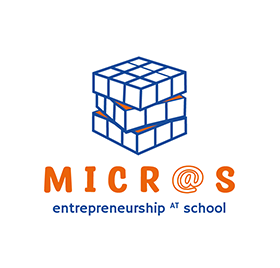Launched in November 2022, this Erasmus+ KA220-SCH – Cooperation partnerships in school education project (Agreement number 2022-1-BE01-KA220-SCH-000086930) entitled “Micro Community cooperative @ School – MICR@S” aims to: provide an INNOVATIVE CROSS-CURRICULAR PEDAGOGICAL MODEL based on GAME BASE LEARNING SOLUTION targeting school students (12-18), which will enable students to learn by doing creating inclusive community cooperative enterprises.
The high rate of dropouts from schools is a common problem all over Europe. It can signify that schools and the education system in general, the mirror of societies, do not properly respond to the education needs of all young in school age. For this reason, is important TO RETHINK THE PEDAGOGICAL APPROACHES TO THE EDUCATIONAL ENVIRONMENT TO MATCH THEM WITH THE REQUIREMENT OF THE WORLD OUTSIDE THE SCHOOL. Allowing students to experience an initial approach to entrepreneurship during their school career will make it easier for them to consider and approach this type of business. This trend is confirmed by research showing that those who have followed this school experimentation are three times more predisposed to start their own business (EU Training Foundation, 2014). In addition, starting to build a project based on the needs of SEN students (Special Educational Needs) will help students to develop more empathic qualities that will help them to become more caring and inclusive leaders in the future. SEN students, on the other hand, will have the opportunity to consider an area that this category of people is unlikely to have access to.
During its lifetime (24 months in total), the project consortium, formed by 7 European entities (CHAMBRE DO COMMERCE BELGO-ITALIENNEASBL (coordinator) from Belgium, A & A Emphasys Interactive Solutions Ltd from Cyprus, European Digital Learning Network ETS from Italy, Agrupamento de Escolas Josè Estevao from Portugal, S.C. HELLO BUCOVINA TRAVEL&TOURS S.R.L. from Romania, ATLANTIS ENGINEERING AE from Greece and LINK GROUP from Serbia) will be involved to achieve its general objective (GO): offering an innovative pedagogical approach to school education by combining inclusion with an entrepreneurial experience, working together in small groups and reflect on issues of vulnerability in class. Students will have the opportunity to work together and develop an inclusive entrepreneurial project, living a unique and enriching experience that will teach them not only about entrepreneurship but also about innovation and inclusion.
In relation to the general objective, there are 3 specific objectives to achieve by the partnership:
- SO1: improving SOCIAL INCLUSION IN THE SCHOOL, fostering collaboration among students (including the ones with SEN) by promoting collaborative projects. It will be reached by creating working groups in which all students (including the ones with SEN) will learn to act as entrepreneurs to solve problems arising within their community and create a real entrepreneurial project to promote INCLUSION IN THE SCHOOL ENVIRONMENT.
- SO2: equipping secondary school students with ENTREPRENEURIAL SKILLS that can prepare them for the demands of the labour market. To reach this specific objective will be developed a TEACHING MATERIAL to transfer the knowledge, skills, and competencies of entrepreneurial education to the student at secondary school.
- SO3: PROMOTING EXCHANGE BETWEEN SCHOOLS AT EUROPEAN LEVEL, to connect students in a reflection on SOCIAL COHESION AND INCLUSION IN SCHOOL EDUCATION through AN ENTREPRENEURIAL EXPERIENCE. During this phase of the project consortium work will be created AN ONLINE SPACE, the so-called MICR@S COMMUNITY COOPERATIVE LEARNING GAME, where students can confront themselves with other students and address other issues related to SOCIAL INCLUSION, SOLIDARITY and ENTREPRENEURSHIP in other European realities.
The direct target groups of the project are:
- TEACHERS: will benefit from new skills and learning outcomes to help their students in acquiring competences closer
- STUDENTS (12-18 years old)
The indirect target groups of the project are:
- STAKEHOLDERS: trainers providers and business incubators, universities, SMEs and private companies, community cooperative
- LABOUR MARKET
- CIVIL SOCIETY
Stay up to date on the project online:
Visit the website: https://micrasatschool.eu/
Follow the project activities on
- Facebook: @Micro Community Cooperative at School
- LinkedIn: @Micro Community Cooperative at School
